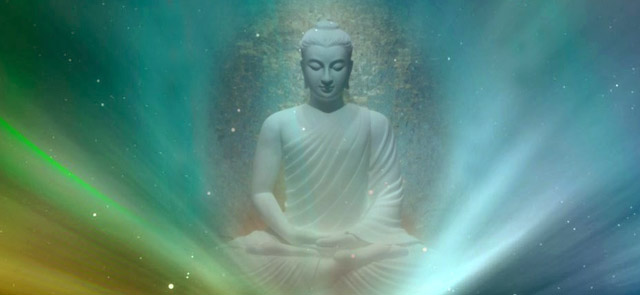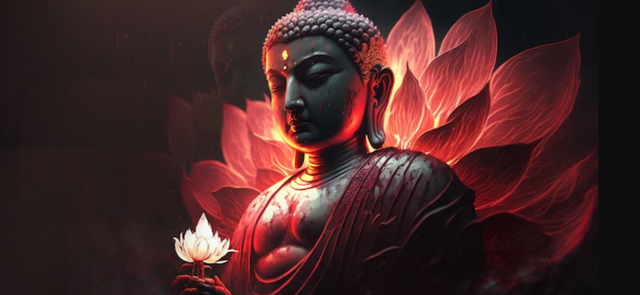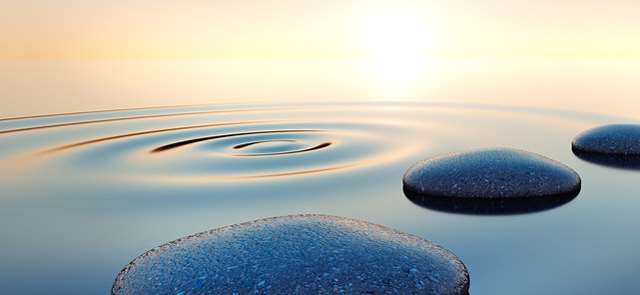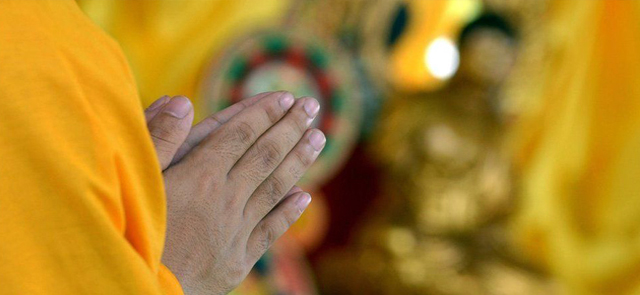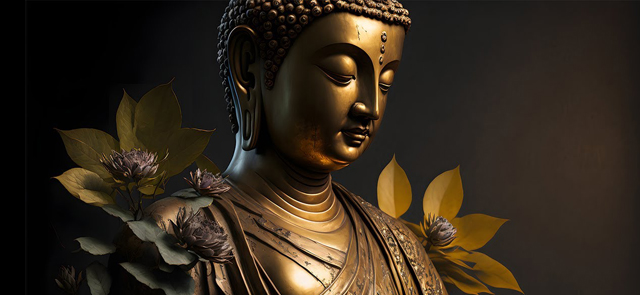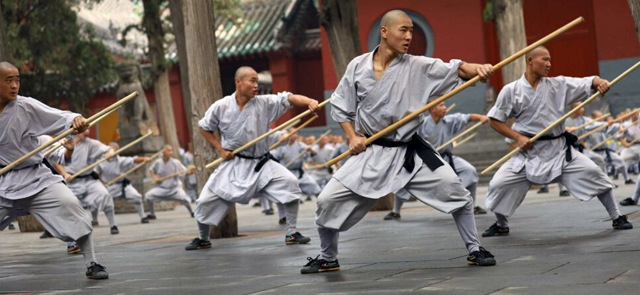In Buddhism, there are ten states of existence, which are also called Ten Dharma Realms [Chin.: shíjiè 十界]. Each Dharma realm has its own characteristics, and its existence is attributed to the retribution of the beings. These ten realms do not appear to be discrete in their forms, as their existence is virtually determined by the state of mind. Therefore, it is important to note that the ten Dharma realms are not beyond a single thought.
The lowest six realms are known as the Six Paths or Six Realms. These six states of existence are subjected to birth and death, and then rebirth for many lives. One's state of existence depends on one's karmic activities. With evil karmic power, one will be born in the lowest three realms, known as Three Evil Paths [Chin.: Sān è dào 三恶道] (of transmigration). With good and kind karma, one will be born in the upper three realms, known as Three Good Paths [Chin.: Sān shàndào 三善道] (of transmigration).
The upper four realms are known as the Four Holy Realms. These four states of existence are beyond birth and death and liberated from the Samsara [Chin.: shēngsǐ 生死 | Sanskr.: Saṃsāra].
Hell [Chin.: Dìyù dào 地獄道]
Suffering is most severe, continuous and everlasting. Those beings must have committed unforgiveable and evil deed, with no regret or repent. The evil karma determines their existence in hell. They suffer until they are completely retributed or the evil karma vanishes. However, for those who committed the Five Offenses, they will stay in hell without any specific time to be liberated.
Ghost [Chin.: Èguǐ dào 餓鬼道]
In this realm, most of the ghosts always live in the atmosphere of anxiety, illusion and fear. Their desires are never satisfied. The hungry ghosts cannot eat as their throat is as narrow as a pin, but their stomach is as large as a drum. Apart from hungry ghosts, there are also Yaksa, Raksa, Spiritual Ghosts, etc.. Spiritual ghosts are dwelling in the nature, e.g. trees, mountains and seas, and protecting the creatures, while Yaksa and Raksa are evil, malignant and violent.
Animal [Chin.: Chùshēngdào 畜生道]
It is a special path. All the beings within the Six Realms which do not belong to any other five realms are categorized in this path. Animals can exist in all other five paths.
Animals have minimal intelligence and consciousness. They live in adaption to the nature. As their behavior follows instinct without deliberation, their karma is neutral, i.e. neither good nor evil.
Asura [Chin.: Xiūluó dào 修羅道]
It is a peculiar path in the Six paths. In terms of material enjoyment and psychic power, it is similar to Deva. However, in some aspects, it is even worse than Human Path. The male Asura is extremely ugly, while the female is as beautiful as an angel. The male Asura always fights with each other as they are cruel and furious. They are proud of themselves, and reluctant to learn and practise the Buddhist teachings.
Man [Chin.: Réndào 人道]
It is the Dhama realm which we are most familiar with. In this realm, we have both happiness and suffering. It is a material world, and the mind activities are always connected with the principles of matter. Joy and happiness are limited as freedom is also limited by the body and other sensual organs of a man. On the other hand, suffering can be the main cause or condition to allow man to possess a kind heart, thus to pursue the Buddhist Way. In this respect, Man Path is better than Deva Path.
Deva [Chin.: Tiāndào 天道]
It is a heaven for those who are wise and kind as the retribution for their good deed. Their major desires will be satisfied. In this path, it is divided into Three Heavenly Realms, namely Desire Heaven Realm, Form (or Rupa) Heaven Realm, Formless (or Arupa) Heaven Realm. In the Desire Heaven Realm, the living beings have strong desire in material and can be easily and fully satisfied with enjoyment. In the Form Heaven Realm, the living beings are not interested in material. Instead, their bodies and mind pursue the spiritual happiness, such as philosophy, music, art and meditation.
In the Formless Heaven Realm, the living beings do not attach to the material nor their own bodies. They are free from any hindrances, and they live in a state of joy, freedom and psychic power. It is the wisdom and the karma of the Deva to determine which heaven realm they live in.
Sravaka [Chin.: Shēngwén 声聞 | Sanskr.: Śrāvaka] - The Sound-Hearer Arhat
It is the first path of the Four Holy (or Sagely) Paths. An Arhat is one who has attained the renunciation of all desires and no attachment to anything. Thus he will be liberated from the reincarnation of the Six Paths as soon as his karmic causes are completely retributed. In this path, it is the joyful state of existence beyond the worldly birth and death because they are enlightened that the worldly phenomena are unreal and impermenent. Sravaka is enlightened while they listen to the Four Noble Truths. Therefore, it is also known as Sound-Hearen Arhat.
Pratyekabuddha [Chin.: Yuánjué Chéng 缘觉乘 | Sanskr.: Pratyekabuddhayāna] - One who seeks his own enlightenment
Pratyekabuddha is also an Arhat, but more superior to the Sravaka. They are enlightened by understanding the Law of Dependent Originations or the Twelve Links of Dependent Originations.
Arhat is devided into four grades of arhatship or fruitions or phala.
1. Srota-aparnna - the one who has entered the stream of holy living. It is the first stage of the arhat, that of a Sravaka.
2. Sakradagamin - the one who comes to be born once more. It is the second grade of arhatship involving only one birth.
3. Anagamin - the one who will not be reborn in this world, but in the Form Realm or Formless Realm, where he will attain to Nirvana.
4. Arhant - the one who enters Nirvana. All Karma of reincarnation is destroyed. He also reaches a state of no-lower learning. He is the highest Saint in Hinayana in contrast with the Bodhisattva as the saint in Mahayana.
Bodhisattva [Chin.: pútísàduǒ 菩提薩埵 | Sanskr.: बोधिसत्त्व (Bodhisattva]
Bodhisattva is an enlightened being. However, he has the affection to other sentient beings. With his Four Immeasurable Minds, he practises the Six Paramitas to cross over the sentient beings from suffering. What Bodhisattvas do is to enlighten themselves, and enlighten others, benefit themselves and benefit others. They cross over the sentient beings in pursuit of attainment of Buddhahood. All these relationships are mutual and interdependent.
All Bodhisattvas do not take refuge in Nirvana. They commit themselves, by their great vows, to be reborn in any Dharma Realm to rescue the sentient beings. There are ten stages or grades of Bodhisattva depending on the extent of their merits and virtues.
Buddha [Chin.: Chéng fó 成佛 | Sanskr.: buddhatva or Samyaksaṃbodhi (Full complete Awakening)]
"If there are people who wish to understand all Buddhas of the three periods of time they should contemplate the nature of Dharma Realm. The Tathagatas are made from mind alone."
Buddha is the highest state of existence of all sentient beings.
There are many many titles of Buddha, but the most common ones are summarized in Ten Titles of Buddha, which respresent the characteristic of Buddha.
Tathagata - the Thus Come Ones
Arhat - Worthy of offerings
Samyak-sambuddha - Of proper and universal knowledge
Vidyacarana-sampanna - perfect in understanding and conduct
Sugata - skilful in leaving the world through liberation
Lokavid - perfect and complete understanding of all worldly Dharma
Anuttara - unexcelled worthy.
Purusa-damya-sarathi - taming heroes
Sasta Deva-manusyanam - teachers of gods and people
Buddha-lokanatha or Bhagavan - Buddha, the World Honoured Ones
Buddha also has Ten Powers which enables him to cross over the living beings, to perform all kinds of merits and virtues with psychic power and to dwell in liberation without hindrance.
Buddha treats all kinds of living beings to be equal. In the course of preaching and crossing over. Buddha is fearless and confident to overcome all difficulties. It is known as Four Fearlessness.
There are also Eighteen Different Characteristics of a Buddha as compared with Bodhisattva and other beings in Dharma Realms.
